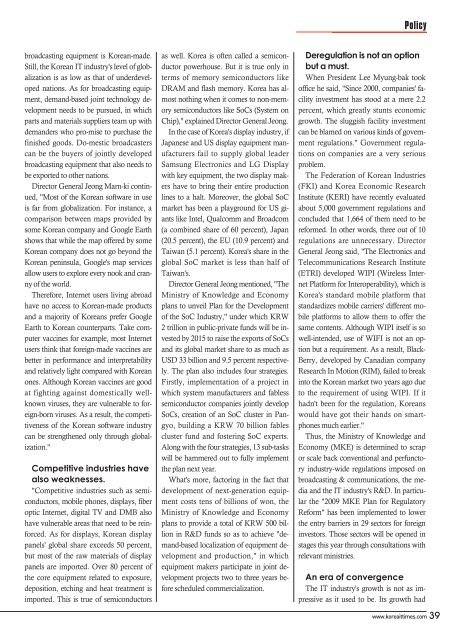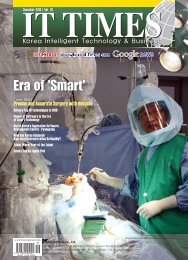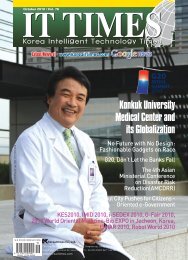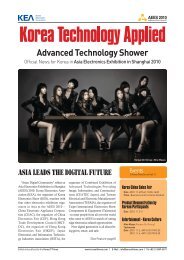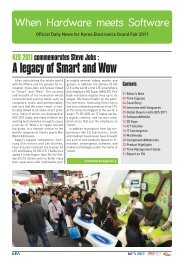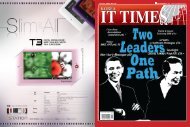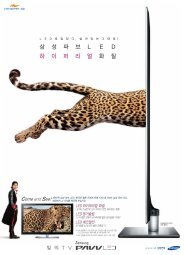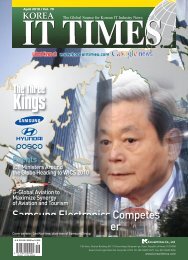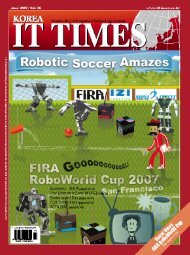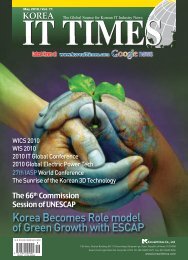2010-07 - Korea IT Times
2010-07 - Korea IT Times
2010-07 - Korea IT Times
You also want an ePaper? Increase the reach of your titles
YUMPU automatically turns print PDFs into web optimized ePapers that Google loves.
Policy<br />
broadcasting equipment is <strong>Korea</strong>n-made.<br />
Still, the <strong>Korea</strong>n <strong>IT</strong> industry's level of globalization<br />
is as low as that of underdeveloped<br />
nations. As for broadcasting equipment,<br />
demand-based joint technology development<br />
needs to be pursued, in which<br />
parts and materials suppliers team up with<br />
demanders who pro-mise to purchase the<br />
finished goods. Do-mestic broadcasters<br />
can be the buyers of jointly developed<br />
broadcasting equipment that also needs to<br />
be exported to other nations.<br />
Director General Jeong Marn-ki continued,<br />
"Most of the <strong>Korea</strong>n software in use<br />
is far from globalization. For instance, a<br />
comparison between maps provided by<br />
some <strong>Korea</strong>n company and Google Earth<br />
shows that while the map offered by some<br />
<strong>Korea</strong>n company does not go beyond the<br />
<strong>Korea</strong>n peninsula, Google's map services<br />
allow users to explore every nook and cranny<br />
of the world.<br />
Therefore, Internet users living abroad<br />
have no access to <strong>Korea</strong>n-made products<br />
and a majority of <strong>Korea</strong>ns prefer Google<br />
Earth to <strong>Korea</strong>n counterparts. Take computer<br />
vaccines for example, most Internet<br />
users think that foreign-made vaccines are<br />
better in performance and interpretability<br />
and relatively light compared with <strong>Korea</strong>n<br />
ones. Although <strong>Korea</strong>n vaccines are good<br />
at fighting against domestically wellknown<br />
viruses, they are vulnerable to foreign-born<br />
viruses. As a result, the competitiveness<br />
of the <strong>Korea</strong>n software industry<br />
can be strengthened only through globalization."<br />
Competitive industries have<br />
also weaknesses.<br />
"Competitive industries such as semiconductors,<br />
mobile phones, displays, fiber<br />
optic Internet, digital TV and DMB also<br />
have vulnerable areas that need to be reinforced.<br />
As for displays, <strong>Korea</strong>n display<br />
panels' global share exceeds 50 percent,<br />
but most of the raw materials of display<br />
panels are imported. Over 80 percent of<br />
the core equipment related to exposure,<br />
deposition, etching and heat treatment is<br />
imported. This is true of semiconductors<br />
as well. <strong>Korea</strong> is often called a semiconductor<br />
powerhouse. But it is true only in<br />
terms of memory semiconductors like<br />
DRAM and flash memory. <strong>Korea</strong> has almost<br />
nothing when it comes to non-memory<br />
semiconductors like SoCs (System on<br />
Chip)," explained Director General Jeong.<br />
In the case of <strong>Korea</strong>'s display industry, if<br />
Japanese and US display equipment manufacturers<br />
fail to supply global leader<br />
Samsung Electronics and LG Display<br />
with key equipment, the two display makers<br />
have to bring their entire production<br />
lines to a halt. Moreover, the global SoC<br />
market has been a playground for US giants<br />
like Intel, Qualcomm and Broadcom<br />
(a combined share of 60 percent), Japan<br />
(20.5 percent), the EU (10.9 percent) and<br />
Taiwan (5.1 percent). <strong>Korea</strong>'s share in the<br />
global SoC market is less than half of<br />
Taiwan's.<br />
Director General Jeong mentioned, "The<br />
Ministry of Knowledge and Economy<br />
plans to unveil Plan for the Development<br />
of the SoC Industry," under which KRW<br />
2 trillion in public-private funds will be invested<br />
by 2015 to raise the exports of SoCs<br />
and its global market share to as much as<br />
USD 33 billion and 9.5 percent respectively.<br />
The plan also includes four strategies.<br />
Firstly, implementation of a project in<br />
which system manufacturers and fabless<br />
semiconductor companies jointly develop<br />
SoCs, creation of an SoC cluster in Pangyo,<br />
building a KRW 70 billion fables<br />
cluster fund and fostering SoC experts.<br />
Along with the four strategies, 13 sub-tasks<br />
will be hammered out to fully implement<br />
the plan next year.<br />
What's more, factoring in the fact that<br />
development of next-generation equipment<br />
costs tens of billions of won, the<br />
Ministry of Knowledge and Economy<br />
plans to provide a total of KRW 500 billion<br />
in R&D funds so as to achieve "demand-based<br />
localization of equipment development<br />
and production," in which<br />
equipment makers participate in joint development<br />
projects two to three years before<br />
scheduled commercialization.<br />
Deregulation is not an option<br />
but a must.<br />
When President Lee Myung-bak took<br />
office he said, "Since 2000, companies' facility<br />
investment has stood at a mere 2.2<br />
percent, which greatly stunts economic<br />
growth. The sluggish facility investment<br />
can be blamed on various kinds of government<br />
regulations." Government regulations<br />
on companies are a very serious<br />
problem.<br />
The Federation of <strong>Korea</strong>n Industries<br />
(FKI) and <strong>Korea</strong> Economic Research<br />
Institute (KERI) have recently evaluated<br />
about 5,000 government regulations and<br />
concluded that 1,664 of them need to be<br />
reformed. In other words, three out of 10<br />
regulations are unnecessary. Director<br />
General Jeong said, "The Electronics and<br />
Telecommunications Research Institute<br />
(ETRI) developed WIPI (Wireless Internet<br />
Platform for Interoperability), which is<br />
<strong>Korea</strong>'s standard mobile platform that<br />
standardizes mobile carriers' different mobile<br />
platforms to allow them to offer the<br />
same contents. Although WIPI itself is so<br />
well-intended, use of WIFI is not an option<br />
but a requirement. As a result, Black-<br />
Berry, developed by Canadian company<br />
Research In Motion (RIM), failed to break<br />
into the <strong>Korea</strong>n market two years ago due<br />
to the requirement of using WIPI. If it<br />
hadn't been for the regulation, <strong>Korea</strong>ns<br />
would have got their hands on smartphones<br />
much earlier."<br />
Thus, the Ministry of Knowledge and<br />
Economy (MKE) is determined to scrap<br />
or scale back conventional and perfunctory<br />
industry-wide regulations imposed on<br />
broadcasting & communications, the media<br />
and the <strong>IT</strong> industry's R&D. In particular<br />
the "2009 MKE Plan for Regulatory<br />
Reform" has been implemented to lower<br />
the entry barriers in 29 sectors for foreign<br />
investors. Those sectors will be opened in<br />
stages this year through consultations with<br />
relevant ministries.<br />
An era of convergence<br />
The <strong>IT</strong> industry's growth is not as impressive<br />
as it used to be. Its growth had<br />
www.koreaittimes.com 39


